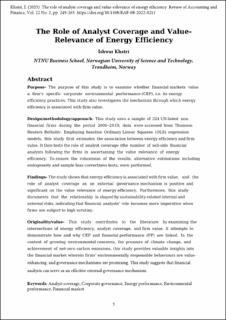| dc.contributor.author | Khatri, Ishwar | |
| dc.date.accessioned | 2024-02-06T09:16:45Z | |
| dc.date.available | 2024-02-06T09:16:45Z | |
| dc.date.created | 2023-04-11T13:34:02Z | |
| dc.date.issued | 2023 | |
| dc.identifier.citation | Review of Accounting and Finance. 2023, 22 (2), 249-265. | en_US |
| dc.identifier.issn | 1475-7702 | |
| dc.identifier.uri | https://hdl.handle.net/11250/3115842 | |
| dc.description.abstract | Purpose
The purpose of this study is to examine whether financial markets value a firm’s specific corporate environmental performance (CEP), i.e. its energy efficiency. This study also investigates the mechanism through which energy efficiency is associated with firm value.
Design/methodology/approach
For the empirical study, a sample of 324 US-listed non-financial firms during the period 2006–2019 was accessed from Thomson Reuters Refinitiv. Using baseline ordinary least squares regression models, this study first estimates the association between energy efficiency and firm value. It then tests the role of analyst coverage (the number of sell-side financial analysts following the firm) in ascertaining the value relevance of energy efficiency. To ensure the robustness of the results, alternative estimations including endogeneity and sample bias correctness tests were performed.
Findings
The study shows that energy efficiency is associated with firm value, and the role of analyst coverage as an external corporate governance mechanism is positive and significant on the value relevance of energy efficiency. Furthermore, this study documents that the relationship is shaped by sustainability-related internal and external risks, indicating that financial analysts’ role becomes more imperative when firms are subject to high scrutiny.
Originality/value
This study contributes to the literature by examining the intersections of energy efficiency, analyst coverage and firm value. It attempts to demonstrate how and why CEP and financial performance are linked. In the context of growing environmental concerns, the pressure of climate change and achievement of net-zero carbon emissions, this study provides valuable insights into the financial market wherein firms’ environmentally responsible behaviours are value-enhancing, and governance mechanisms are impactful. This study suggests that financial analysts can serve as an effective external corporate governance mechanism. | en_US |
| dc.language.iso | eng | en_US |
| dc.publisher | Emerald | en_US |
| dc.rights | Navngivelse 4.0 Internasjonal | * |
| dc.rights.uri | http://creativecommons.org/licenses/by/4.0/deed.no | * |
| dc.title | The role of analyst coverage and value-relevance of energy efficiency | en_US |
| dc.title.alternative | The role of analyst coverage and value-relevance of energy efficiency | en_US |
| dc.type | Journal article | en_US |
| dc.type | Peer reviewed | en_US |
| dc.description.version | acceptedVersion | en_US |
| dc.source.pagenumber | 249-265 | en_US |
| dc.source.volume | 22 | en_US |
| dc.source.journal | Review of Accounting and Finance | en_US |
| dc.source.issue | 2 | en_US |
| dc.identifier.doi | 10.1108/RAF-08-2022-0211 | |
| dc.identifier.cristin | 2139996 | |
| cristin.ispublished | true | |
| cristin.fulltext | postprint | |
| cristin.qualitycode | 1 | |

